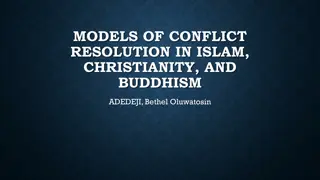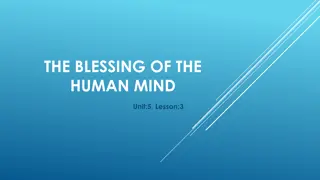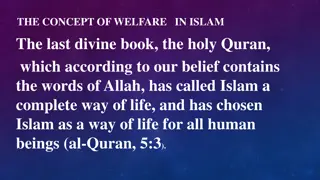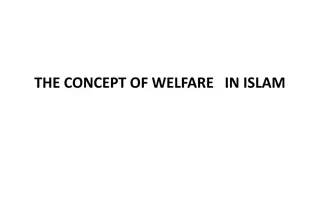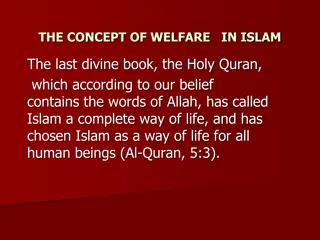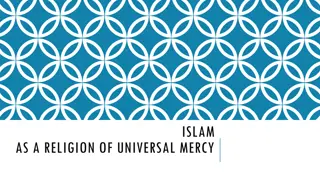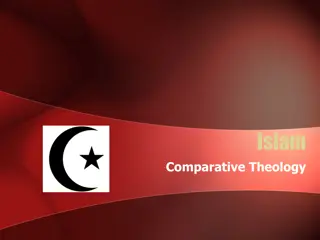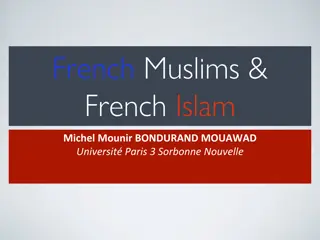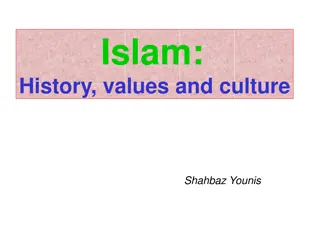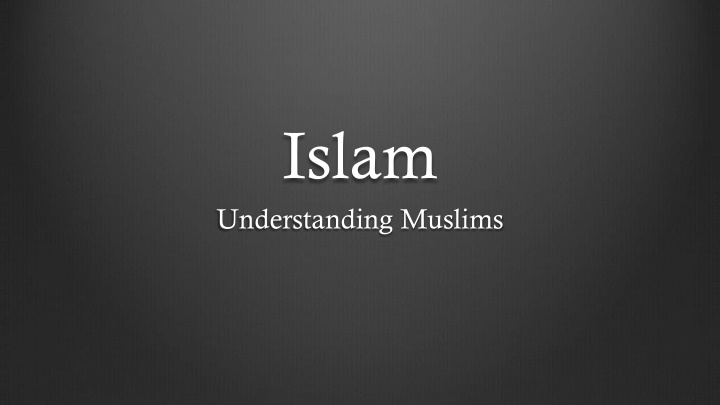
Islam: Beliefs, Practices, and History
Explore the core beliefs and practices of Islam, including the Five Pillars, beliefs in God, prophets, angels, and the Day of Judgment. Learn about the significance of key figures like Muhammad, the importance of the Quran, and the role of Hadith in Muslim culture. Gain insights into the foundation and principles of Islam through this comprehensive overview.
Download Presentation

Please find below an Image/Link to download the presentation.
The content on the website is provided AS IS for your information and personal use only. It may not be sold, licensed, or shared on other websites without obtaining consent from the author. If you encounter any issues during the download, it is possible that the publisher has removed the file from their server.
You are allowed to download the files provided on this website for personal or commercial use, subject to the condition that they are used lawfully. All files are the property of their respective owners.
The content on the website is provided AS IS for your information and personal use only. It may not be sold, licensed, or shared on other websites without obtaining consent from the author.
E N D
Presentation Transcript
Islam Understanding Muslims
The Five Pillars Confession of Faith There is no God but Allah and Muhammad is his prophet. Ritual Prayer Observed 5 times each day, and congregationally on Friday Almsgiving Giving 2.5% of the person s wealth Fasting Observed during the month of Ramadan Pilgrimage Travel to Mecca at least once during lifetime
The Five Pillars set the standard for Islam. Muslims determine the practice of Islam.
What do Muslims believe? Belief in God - Allah as the one God, Creator, the Sustainer, and the Sovereign Law Giver of the Universe. Belief in His Books - The Holy Quran, the Torah, Psalms, and the Injeel (the New Testament). Belief in His Prophets and Messengers - The Messengers of Allah, including among others, Adam (the first man), Noah, Abraham, Moses, David, Jesus, and finally Mohamed, the last of the prophets.
What do Muslims believe? Belief in His Angels - Allah s angels, jinn who are his agents Belief in the Day of Judgment - The Last Day, the Resurrection of the Dead, the day of judgment, when all people will be held accountable for their beliefs, to spend eternal life in paradise or hell. Belief in God s Divine Decrees - Divine preordaining of everything that happens, whether good or bad, transpiring under the authority of Allah, according to his will.
Mohammed The last messenger of God. The most revered prophet. (Don t say bad things about him.) Muslims do not worship Mohamed. Created the model community of submission in Medina (622 AD). Muslims, including women, look back to this as the starting point of their calendar and the high point of human history. Admitted he is only a man (Sura 18:110). Was not without sin (Sura 40:55, 48:1-2).
The Quran A direct copy of the original is in Heaven. Dictated to Mohamed by the angel Gabriel (610-632 AD). God s perfect eternal and unchanging Word. Sent to inform man of God s law. Supersedes previous scriptures. Most beneficial when chanted with correct pronunciation whether understood or not. Written verses used as charms in folk Islam.
The Hadith Authenticated sayings of Mohamed collected after his death. Many cultural practices are found in the Hadith. Where did you get that? It s not in the Quran. Oh, it s in the Hadith Sunnah refers to habits and practices of Mohamed s life. Many Muslims cannot understand the Quran, so the Hadith is usually the greatest influence on the practice Islam.
What makes Christianity different from Islam? Worldview Comparison
God Christian View Islamic View Eternal, immutable, self- sufficient Eternal, immutable, self- sufficient Omnipotent, omniscient, omnipresent Omnipotent, omniscient, omnipresent Immanent in this world Utterly transcendent but sees all God is one, but reveals himself to us as three persons God is absolutely one, without associates, without persons
Creation Christian View Islamic View God created all things in six days. God created all things in six days. God created the earth entirely good, without evil. God created the earth as it is now. God created Adam from dust and breathed life into him from His breath. God created Adam from a lump of clay and breathed life into him from His spirit. Death and suffering entered the earth because of man s sin. God created the world with death and suffering. Death is God s will for man and His mercy to society.
Man Christian View Islamic View God made man in His own spiritual image. God gave man spiritual qualities, but God is entirely unlike man. Adam and Eve disobeyed God by eating the forbidden fruit. Adam and Eve disobeyed God by eating the forbidden fruit. Mankind fell from the original condition and since then man is born with a sinful nature. Adam repented and was forgiven. There was no spiritual fall. Man continues to be born with a good nature.
Sin Christian View Islamic View There are different categories of sin. Only the worst ones may disqualify a person from entering paradise. Everyone commits lesser slips, mistakes, lapses and if they repent, they are forgiven. All people sin. Sin disqualifies a person from entering heaven. People sin because their fallen human nature inclines us toward sin. People sin because they are weak and forgetful of God s laws. Ultimately, every good or evil action is predestined by God. Those whom He guides fulfill His requirements.
Jesus - Similarities The coming of Jesus was foretold by prophets. Jesus was born of the Virgin Mary and did many miracles. Jesus was a prophet. Jesus was without sin. Jesus ascended to heaven. Jesus is coming again.
Jesus - Differences Christian View Islamic View Jesus is the Christ (Messiah) because he is the anointed Savior- King over God s Kingdom. The title Messiah is of uncertain meaning. The Christians claim that God had sexual relations with a woman. This is blasphemy. Jesus is the only begotten Son of God. Jesus was only a prophet and was not divine. Jesus Christ is God and reveals what God is like. Jesus did not die. Someone else died in his place. There is no sacrifice that can atone for sin. No one can help man at the judgment. Jesus died on the cross as the only perfect sacrifice for sin.
Jesus - more differences Christian View Islamic View God would not allow one of His prophets to be humiliated by crucifixion. God demonstrated His love for us through the sacrifice of Christ. Jesus Christ rose from the dead. Jesus did not die or rise from the dead. The resurrection showed that Jesus conquered sin and death. Jesus ascended without death and resurrection. Jesus has been given all authority in heaven and on earth. Jesus does not rule. Only God has power.
Jesus - still more differences Christian View Islamic View One cannot make petitions to God in Jesus name. This would be making him equal with God and would be shirk, the worst of sins. Praying in Jesus name is appropriate since our relationship to God is based on His sacrifice. Jesus will judge the living and the dead. Jesus will return and force everyone to become Muslims. God will be the judge. Jesus will establish his universal kingdom over heaven and earth and will rule forever. Jesus will die and be buried.
Salvation Christian View Islamic View Salvation is by God s grace through faith in Christ alone. If God wills, one can be saved by believing in God s Unity and following His guidance. (Faith + Works) Faith in Christ involves personal trust and commitment to Him, as well as repentance from what displeases Him. Faith involves agreeing to the revealed doctrines, especially God s unity. Good deeds please God but they do not earn grace, forgiveness, or eternal life. They do not cancel sins. If God wills, one s good deeds will outweigh his bad deeds and gain him paradise in the end.
Heaven / Paradise Christian View Islamic View God is present in Heaven. The greatest pleasure of Heaven is close fellowship with God. God is not present. He is far away and cannot be known. The primary pleasures of Paradise are food and sex. Believers have been regenerated and progressively transformed on earth, and they are fully sanctified and glorified in Heaven. Those in Paradise are similar to how they were on earth. There is no moral transformation of their nature.
Where do we go from here? Sharing the Gospel with Muslims
Establishing a new perspective Muslims are not opposed to the Gospel. They have just never heard.

